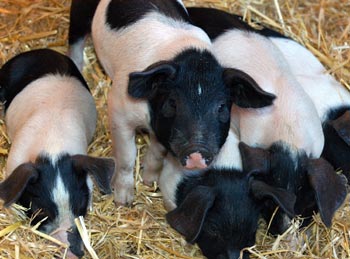
Publisher:
Bonnie King
CONTACT:
Newsroom@Salem-news.com
Advertising:
Adsales@Salem-news.com

~Truth~
~Justice~
~Peace~
TJP
Apr-05-2007 05:01

 TweetFollow @OregonNews
TweetFollow @OregonNews
ODA and OSU Offer an Important Reminder to Buyers of Out-of-State Pigs and Lambs
Salem-News.comPigs and lambs for market shows are often purchased this time of year by FFA and 4-H youth.
 Salem-News.com |
(SALEM) - It's the season for FFA and 4-H livestock projects, when animals are purchased for upcoming fairs and shows.
The Oregon Department of Agriculture and Oregon State University Extension Service are reminding livestock buyers and sellers that animals coming into Oregon require a Certificate of Veterinary Inspection (CVI) and an import permit.
The documents are an important tool in helping to keep specific diseases from entering the state and in tracing back the source of infection should a disease outbreak occur.
An accredited veterinarian from any state can provide the CVI and permit for the out-of-state livestock seller or shipper. The buyer in Oregon should be aware of the requirements and insist the seller provide the documents.
Pigs and lambs for market shows are often purchased this time of year by FFA and 4-H youth.
The CVI and permit are required by the State of Oregon to control specific regulatory diseases. As an example, pigs entering Oregon must be inspected by an accredited veterinarian 15 days before shipment, must not be showing external signs of disease, must not have ever been fed raw garbage, and must not have been vaccinated for pseudorabies.
A CVI and Oregon import permit does not ensure imported animals are free of all diseases.
Pigs and lambs may be incubating a disease at the time of shipment.
Livestock can become stressed by shipping, changes in environment and temperature, and other factors that can lead to illness on or after arrival.
ODA and OSU emphasize the importance of the owners of imported livestock to practice good biosecurity to prevent their other animals from becoming ill with a potentially contagious disease. The arriving animals should be isolated from other animals for at least three weeks.
A single fence separation is not considered proper isolation.
Proper separation is determined by many factors such as time of year and the facility.
Sharing of feed and water containers can also transmit disease.
Persons feeding or caring for livestock should attend to the new animals after they first tend to their other animals.
Boot and hand disinfection should be used when leaving the facility that holds the new animals.
Frequent cleaning and disinfection of the facilities is also important.
In addition, owners should be aware of the temperature needs of newly purchased project animals. For example, placing new feeder pigs in a cold barn without supplemental heat or protection increases stress and the likelihood of illness.
By confirming that livestock animals purchased from another state have the required CVI and import permit, and by practicing basic biosecurity and good animal husbandry once those animals arrive, FFA and 4-H youth with livestock projects in Oregon can have a good experience this year.
For more information, contact ODA's Animal Health and Identification Division at (503) 986-4680 or Gene Pirelli, Oregon State University Extension Swine Specialist at (503) 623-8395.
Articles for April 4, 2007 | Articles for April 5, 2007 | Articles for April 6, 2007





Quick Links
DINING
Willamette UniversityGoudy Commons Cafe
Dine on the Queen
Willamette Queen Sternwheeler
MUST SEE SALEM
Oregon Capitol ToursCapitol History Gateway
Willamette River Ride
Willamette Queen Sternwheeler
Historic Home Tours:
Deepwood Museum
The Bush House
Gaiety Hollow Garden
AUCTIONS - APPRAISALS
Auction Masters & AppraisalsCONSTRUCTION SERVICES
Roofing and ContractingSheridan, Ore.
ONLINE SHOPPING
Special Occasion DressesAdvertise with Salem-News
Contact:AdSales@Salem-News.com
Terms of Service | Privacy Policy
All comments and messages are approved by people and self promotional links or unacceptable comments are denied.
[Return to Top]
©2025 Salem-News.com. All opinions expressed in this article are those of the author and do not necessarily reflect those of Salem-News.com.